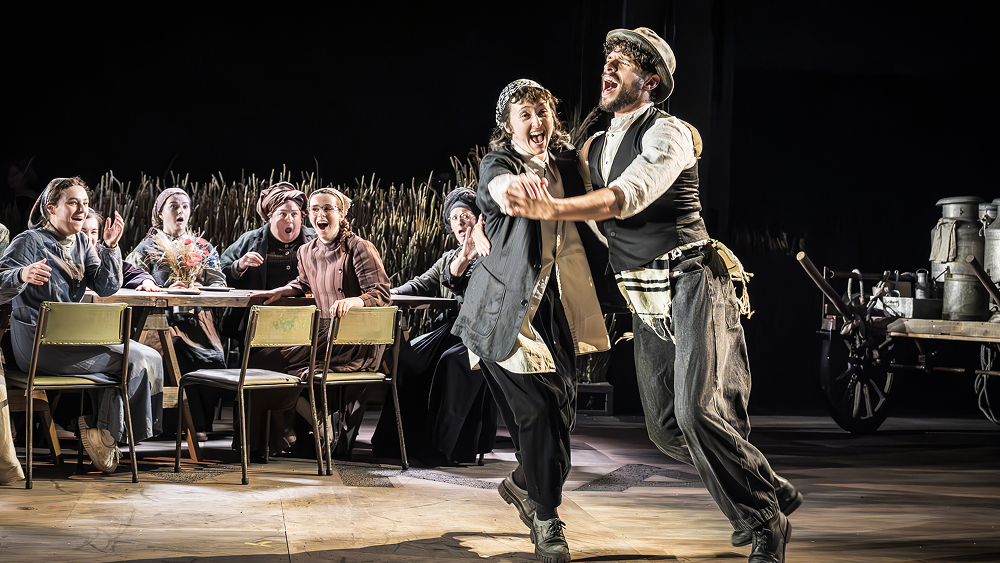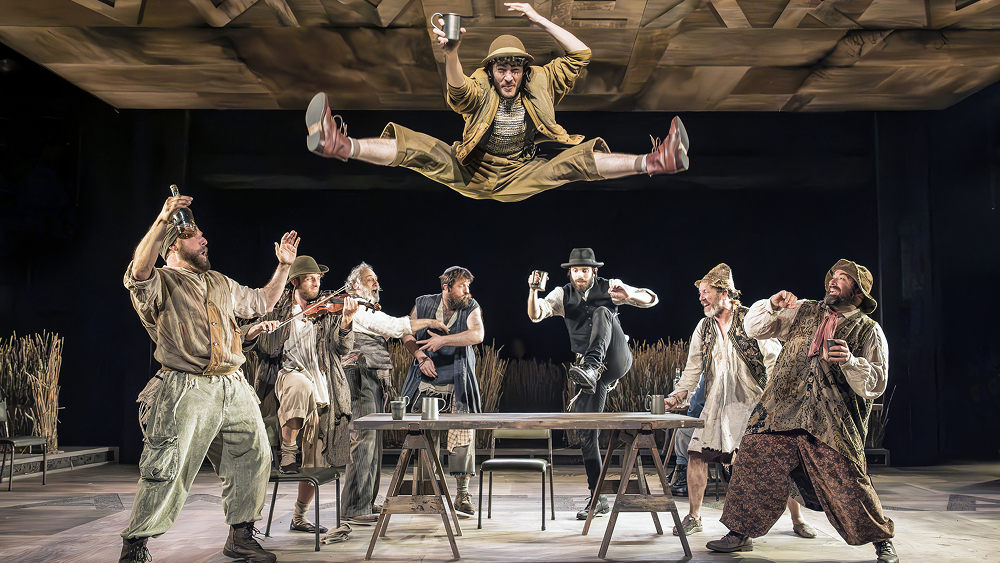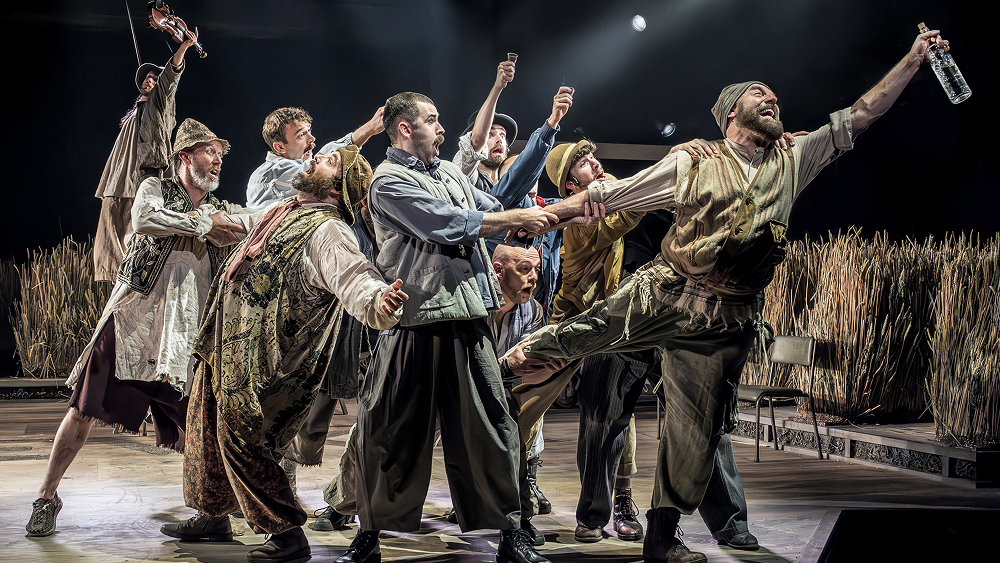If you think you know Fiddler on the Roof (if you can hum the opening bars of ‘If I Were a Rich Man’ or picture Topol’s Tevye, arms akimbo beneath a painted shtetl sky), prepare to have your expectations upended at the Barbican. Jordan Fein’s revival, fresh from its sold-out run at Regent’s Park Open Air Theatre and newly crowned with an Olivier for Best Musical Revival, is a masterclass in balancing reverence for tradition with the urgency of reinvention. This is Fiddler as you’ve never quite seen it: stripped of kitsch, pulsing with life, and as relevant as ever.
What is Fiddler on the Roof? At its heart, it’s a musical about a community on the brink of change. Set in the fictional Russian village of Anatevka at the turn of the 20th century, it follows Tevye, a poor Jewish milkman, as he struggles to maintain his family’s traditions in the face of encroaching modernity and growing anti-Semitic threat. The show, with a book by Joseph Stein, music by Jerry Bock, and lyrics by Sheldon Harnick, premiered on Broadway in 1964 and quickly became a touchstone of musical theatre. Its songs Tradition, Matchmaker, Matchmaker, Sunrise, Sunset are woven into the fabric of the genre, and its themes of family, faith, and resilience have echoed through decades and across continents.
But Fiddler is no mere museum piece. Fein’s production makes that clear from the first image: the iconic fiddler, not perched on a quaint rooftop, but standing among wheat sheaves on a jagged strip of earth, peeled back and suspended above the stage like a wound in the landscape. Tom Scutt’s set is stark and poetic, the wheat field a constant reminder of the community’s connection to and dependence on the land. The costumes are similarly evocative: handmade, earth-toned, and lived-in, they ground the characters in a world that feels both specific and universal.

The story unfolds as Tevye’s three eldest daughters, Tzeitel, Hodel, and Chava, begin to challenge the arranged marriages and strict customs that have governed their lives. Tzeitel, the eldest, refuses to marry the wealthy but unlovable butcher Lazar Wolf (the best name for a character in a musical ever), choosing instead her childhood sweetheart, the timid tailor Motel. Hodel falls for Perchik, a radical student who brings news of revolution from the outside world. And Chava, the quiet bookworm, dares to love Fyedka, a Russian Christian, a step too far for even Tevye’s famously flexible sense of tradition. Each daughter’s rebellion is both a personal act of courage and a crack in the communal edifice, and as their choices accumulate, the village’s fragile equilibrium begins to crumble.
Adam Dannheisser’s Tevye is superb. Eschewing the broad comic strokes that have sometimes defined the role, Dannheisser gives us a man of real complexity: physically imposing yet emotionally vulnerable, quick with a joke but haunted by uncertainty. His Tevye is less the showman, more the weary patriarch, his inner conflicts, between love and law, faith and pragmatism, etched in every gesture. When he sings ‘If I Were a Rich Man,’ it’s not a vaudeville turn but a genuine plea, a moment of longing that resonates deeply. His scenes with Lara Pulver’s Golde, especially their bittersweet duet ‘Do You Love Me?,’ are beautifully observed, revealing the tenderness beneath decades of shared struggle.
The supporting cast is equally strong. Liv Andrusier’s Tzeitel is all chutzpah and heart, her chemistry with Dan Wolff’s Motel, whose nervous energy is both endearing and hilarious, providing some of the evening’s most joyful moments. Georgia Bruce’s Hodel and Daniel Krikler’s Perchik bring a youthful idealism to their scenes, while Hannah Bristow’s Chava is quietly devastating, her eventual estrangement from her family rendered with heartbreaking clarity. Beverley Klein’s Yente, the matchmaker, provides much-needed comic relief, her rapid-fire delivery and sly asides landing every laugh.

Fein’s direction is marked by restraint and clarity. He resists the temptation to hammer home the show’s contemporary parallels, trusting the material and the audience to make the connections. In a world once again witnessing the displacement of communities and the resurgence of intolerance, the sight of torch-wielding Russian thugs smashing up a wedding feels chillingly immediate. Yet Fein never allows the production to tip into despair. The joy of community, the small acts of defiance, the moments of laughter and song, these are given equal weight, reminding you that resilience is as much a part of the story as loss.
Fiddler on the Roof has always been about the tension between continuity and change, between the comforts of tradition and the demands of a changing world. You feel it in the audience’s collective intake of breath as Tevye turns his back on Chava, in the laughter that bubbles up during ‘Matchmaker, Matchmaker,’ in the silence that follows the final, wrenching exodus. The show’s themes of faith, family, displacement could hardly be more timely, and yet there’s nothing didactic or heavy-handed about this production. Instead, it invites you to see yourself in Anatevka’s villagers, to ask what traditions you cling to and at what cost.
Compared with the previous Regent’s Park staging, this Barbican production feels slightly more intimate despite the larger venue. The set has been adapted to fit the Barbican’s proscenium stage, which brings a more contained atmosphere that focuses attention on the characters’ emotional journeys. Some musical arrangements have been subtly refined, with Aspinall’s orchestration gaining a richer texture that adds depth without overwhelming the storytelling. The performances remain consistently strong, though Dannheisser’s Tevye here shows a touch more weariness, adding layers to the character’s internal conflict. These minor differences enhance the production’s impact and demonstrate the creative team’s thoughtful responsiveness to the new space and audience.


